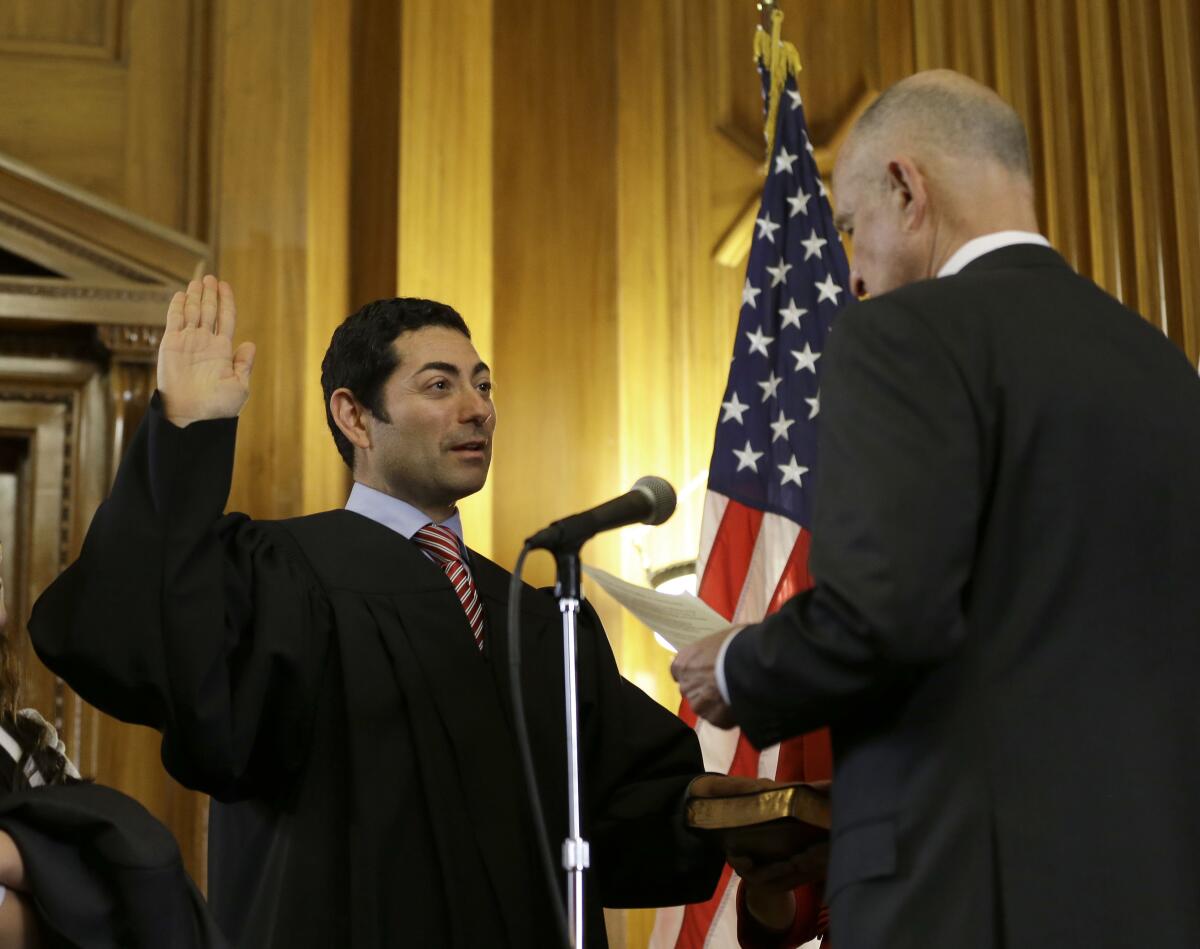California Supreme Court Justice Mariano-Florentino Cuéllar steps down to head think tank

SAN FRANCISCO — California Supreme Court Justice Mariano-Florentino Cuéllar said Thursday that he will step down to run an influential foreign-policy think tank, giving Gov. Gavin Newsom an opportunity to pick his second jurist for the state’s highest court.
Cuéllar, 49, will head the Washington-based Carnegie Endowment for International Peace, succeeding William J. Burns, whom President Biden has selected to head the Central Intelligence Agency. Cuellar will open a West Coast office for the endowment in Silicon Valley.
Newsom is expected to choose a Latino to replace Cuéllar, a Mexican immigrant who earned degrees from the nation’s top universities, joined the faculty of Stanford University, worked for two Democratic presidential administrations and forged a moderately liberal path on the state’s highest court.
Cuéllar, in an interview, called serving on the court since 2015 “an extraordinary journey” and “frankly humbling.” Nominated by Gov. Jerry Brown, Cuéllar wrote some of the court’s highest profile rulings and led an effort to break down language barriers in courthouses throughout the state.
His decision to leave the court for the prestigious think tank comes as his wife, U.S. Dist. Judge Lucy Koh, faces confirmation hearings for the U.S. 9th Circuit Court of Appeals. The couple, who live in the Bay Area, have two teenagers, one soon to head to college.
Cuéllar is likely to more than double his salary at the fellowship, according to online pay information about nonprofits, and the move will put him at the helm of an organization that has helped propel members into major government posts.
His decision to step down from the court came as a surprise to many. “My perception of Justice Cuellar is he is a man who very much enjoys his job,” said Kirk Jenkins, an appellate lawyer who closely follows the court.
Cuéllar has been “moderately liberal” on civil law questions and “somewhat liberal” on criminal matters, Jenkins said. He has a practical view of the law that shows in both his questions during hearings and in his written rulings.
During oral argument, Cuéllar is “very open and approachable in a way that can be a little deceiving,” Kirk said. “Justice Cuéllar can have you on the ground without you ever realizing the battle has started,” Jenkins said.
Cuéllar’s written rulings have been clear and well-written and aimed at providing lower courts with easy-to-grasp guidance.
Cuéllar was born in Matamoros, Mexico, and for years crossed the border by foot to attend school in Texas. He moved with his family when he was 14 to the Imperial Valley, where his father taught in schools and colleges. The family lived in a Victorian on a busy corner in Calexico, and Cuellar attended a public high school with farm laborers and blue collar workers.
Even in high school, he was “thoughtful and very intellectual, going deep in trying to understand” concepts and debating teachers, said Daniel M. Wong, a fellow classmate. Cuéllar attended all honors classes and was “top class valedictorian,” said Wong, an Orange County resident who is marketing director of a major software company.
After graduating from high school, Cuéllar obtained a bachelor’s degree from Harvard, a law degree from Yale and a doctorate in political science from Stanford.
In addition to his scholarly work, Cuéllar served as a special assistant to former President Obama, working on food safety laws and sentencing reform, and advised the Clinton administration on federal crime regulatory issues.
Melody C. Barnes, a former assistant to Obama and director of his Domestic Policy Council, said the administration sought out Cuéllar after he had served on a team of advisors during the campaign. She called his intellect “staggering.”
“He is well-versed on a number of different issues, and he can go deep,” she said. “Just because of his intellectual capacity, he is able to take on new issues and get up to speed very, very quickly,” a skill she said was highly regarded and needed at the White House.
Dr. Bob Kocher, who served Obama as special assistant to the president for healthcare and economic policy, said Cuéllar commuted back to California every weekend to see his family and returned on a redeye to Washington. At 7:45 a.m. on Mondays, Kocher recalled that Cuéllar would come into the building and “bounce down the hallways, the happiest, most wakeful, full-of-joy person” in the place.
During meetings that otherwise might have been dull, Cuéllar had a disarming way of asking incisive questions and perking up the conversation, Kocher said. “He has so much humility that people weren’t scared of him,” Kocher said.
Cuéllar’s possible successors on the state high court include Mónica Ramírez Almadani, who heads Public Counsel, a Los Angeles-based, pro bono public interest law firm; state Court of Appeal Justice Patricia Guerrero, who serves in San Diego; and Judge Victor A. Rodriguez, a longtime staff attorney at the California Supreme Court whom Newsom just appointed to the San Francisco-based state Court of Appeal. Rodriguez has been an Alameda County Superior Court judge since 2018.
Newsom also may consider U.S. District Court Judge Yvonne Gonzalez Rogers, an Obama appointee who serves in the Bay Area.
For decades, the California Supreme Court was dominated by Republicans. That changed under Gov. Brown, who appointed four of the seven justices to fill retirements.
Newsom now has one appointee on the the court, Justice Martin Jenkins, the fifth Democratic member. Jenkins, who is Black, rose through the courthouse ranks and became the first openly gay member of the state’s highest court. He is considered a moderate.
More to Read
Sign up for Essential California
The most important California stories and recommendations in your inbox every morning.
You may occasionally receive promotional content from the Los Angeles Times.











